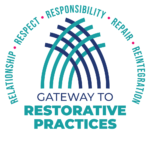What are Restorative Conversations?
A restorative conversation is any conversation that uses restorative questions in which an issue is approached with an open mind to:

- “Truly understand what happened
- Authentically listen and provide a space where everyone involved authentically listens to one another
- All voices are heard
- Focus on the impact the situation/actions had on others and the larger community
- Identify any unmet needs (especially for those harmed), and
- Determine what needs to happen to make things as right as possible moving forward.”1
Traditional Restorative Questions
The International Institute of Restorative Practices sells business sized cards that ask the restorative questions. Side 1 are the questions to ask the offender, the person who caused harm.
- What happened?
- What were you thinking at the time?
- What have you thought about since?
- Who has been affected by what you’ve done?
- In what way have they been affected?
- What do you think you need to do to make things right?
Side 2 questions are to ask the victim, the those affected.
- What did you think when you realized what had happened?
- What impact has this incident had on you and others?
- What has been the hardest thing for you?
- What do you think needs to happen to make things right?
Lecture?
A key reminder: there is no question number six that says, “Now give them a lecture.”
It’s tempting to insert your wisdom into the process but it’s not your conversation. Trust that the process of asking the questions leads students to resolve the conflict. As needed, summarize the conversation and invite the students to reflect on what they’ve learned.
Why?
You may note that there is no question that asks why? There are several reasons we don’t ask, “Why did you do that?”
First, it’s not helpful or relevant to resolving the conflict.
Second, the students don’t usually know why.
Third, if students dig for a reason it often ends up being a rationalization or justification which goes against the process of taking personal responsibility.
Sources:
What are restorative conversations? www.healthiersf.org
Image: why-1432955 [Pixabay.com]

